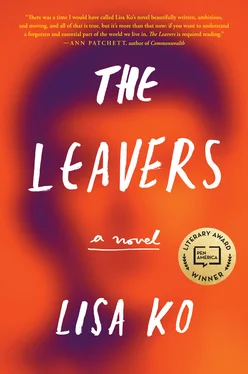Didi asked her boss if she’d hire another nail technician, and her boss said they didn’t need one, but maybe soon. I couldn’t hold out for that. Had to pay off my loans, and that would take another seven or eight years, less if I got a higher-paying job, preferably one that didn’t involve pulling on a ba wa. Waitressing was the best job, especially in a Japanese or Thai restaurant, which paid more than a Chinese restaurant, even though Chinese people ran all of them. But it was tough to get a waitressing job without the right connections.
I got a job at a factory with shorter shifts, sewing shirts for six hours a day, enough to meet the minimum payments to the loan shark. The interest had gone up, and I still owed so much. I’d fall asleep while giving you a bath, waiting until my roommates had used the bathroom first, days since I’d had a shower myself. I smelled like a foot. Except for Didi, there was no more cooing over baby toes. Now my roommates hurried out of the room when you began to cry.
Didi said she’d look after you when I was at the factory, and I tried to line up my shifts to coincide with the times she wasn’t working, but when I couldn’t, I had to stay home. Hetty had told me about a babysitter, and I visited her, twelve kids inside a two-bedroom apartment that smelled of mold, most of them crying, a few of them coughing. The woman had sat and smoked as one kid swatted another in the face. I wasn’t going to leave you in a place like that. I couldn’t even afford her on my salary. Imagine what a cheaper babysitter would be like.
Then it was fall. Didi’s mother was sick. There were medical bills to pay back home, and Didi needed to take on more hours at the salon.
“It’s not a problem,” I said. “I can take him with me.”
As soon as I walked into the factory you started to cry. Can’t say I blamed you — the room was packed and windowless, a quarter of the size of the room I’d worked in back at the Fuzhou factory. Your wails chorused along with the sewing machine motors, and I held you close, tried to avoid the other women’s nasty looks.
I put a bag of diapers and bottles beneath my machine. “What are you thinking?” hissed the woman to my left. “That baby came out of your pussy last week.”
I placed some scraps of fabric inside an empty box and set you down in it, hoping the noise would mask your crying.
A mass of shirts awaited me. My job was hems. Fold the fabric, run it through the serger. A job that required focus and steady hands, things I’d always prided myself on, fold, press, sew, fold, press, sew. Each shirt bringing me closer to zero debt.
Today, the hours that usually passed with a numbing dullness were crawling by even more slowly than the longest day in the history of school. I kept thinking about when I’d have to feed you, and where I could go to do that. There were no breaks in a six-hour shift. The woman at the next machine shot me incredulous looks as you wailed ceaselessly — as if the noise and heat had given you permission to cry even louder — and my hand slipped. The thread veered sideways off the hem, the fabric violently bunched.
I tossed the ruined shirt and picked up a new one. My mind was running in half-time, hands twitching from not enough sleep, and again the needle staggered away from its path. “Damn it!”
The woman next to me clucked her tongue. According to the clock on the wall, only ten minutes had passed.
“Looking at the clock instead of doing work,” my neighbor sang, firing off another shirt.
“Mind your own business,” I sang back. I did three shirts successfully, but the detours had thrown off my game. Again I looked at the clock. The woman next to me picked up a fresh pile of shirts, my first pile unfinished. Your sobs had sputtered out into hyperventilating hiccups.
I crouched down. When you saw me, you held your arms up.
“Little Deming,” I said. “Mama’s right here.”
It was hot down there. Dusty. Beneath the table, I saw feet pressing their machine pedals. One woman wore mismatched socks, another a sneaker with a hole in the side. I kissed you. “Mama’s busy now,” I said, in a soothing tone I hoped matched Didi’s. “Be quiet for a moment, and I’ll feed you soon.”
I put you down and sat back in my chair. Finally, you were quiet. The woman next to me was already on her third pile of shirts, but at least I’d finished one.
Fold, press, sew. Fold, press, sew. You were crying again. I raced the serger to the end of the fabric and threw the shirt into the finished stack. “Hold on,” I said, but you were screaming. I fumbled for a bottle, struggling to lift you while keeping you obscured inside the box, one hand behind your neck, the bottle in my right armpit. You tugged at the bottle. My knees hurt from squatting. You yanked, I lost my balance, and as I fell backwards my head hit the underside of the table. Ass to the floor, the bottle slipped from my hands and fell into the box, landing on your legs. You wailed. I rubbed my head. That was how the forelady found me, under the table with a crying baby and a box of fabric stained with spilled formula.
THAT’S WHEN I WALKED out. Down the block, past Grand, Pitt, Madison, Pike. Clinton, Henry, Essex, Cherry. Cars honked as I zigzagged in the middle of the street with you strapped to my chest. Montgomery, Jackson, Water.
I didn’t know where I was going. I paused at the chain-link fence of a playground, no children outside on this late September day, just crooked basketball hoops, a flag flapping in front of an elementary school and a row of tall buildings in the background. The forelady had given me the rest of my shift off without pay, said I could keep my job as long as I showed up tomorrow without a baby.
My brain returned to calculating how little I would make this month. Even if I worked fourteen-hour shifts there wouldn’t be enough to pay rent and the loan shark and a babysitter. Didi’s mother was sick.
To the water, then, with its choppy gray waves, the muffled thumping of cars on the bridge above. The row of benches deserted on a weekday afternoon. Barges floated along the river.
I was so tired. All I wanted was to be by myself in a silent, dark room.
Send him back. It’s the only way.
You kicked me like you wanted to be freed. I don’t want to tell you what I did.
Fast now, before I could change my mind, looking around to make sure no one could see me, I set the bag on the pavement under the bench and lowered you inside. The bag was taller than you, its sides a stiff, insulated plastic. When I got up I was lighter, relieved.
I ran.
“I’M SORRY, I’M SORRY!”
You sobbed. I squeezed your body against mine.
I’d gone almost two blocks before coming to a crosswalk. The light was moving from yellow to red, but a bus was slowly making its way through the intersection. If the light had remained yellow a moment longer, if there’d been no bus, would I have kept running?
But I did return, and the bag was there, and you were still inside.
I stroked your hair. “Mama,” you said again. “ Ma -ma!”
I called Yi Ba and told him I had a son I was sending to the village until I paid down my debt and until you were old enough to go to school in New York.
Yi Ba made a sound like he was clearing mucus. “ Hrm . Going all the way to America to end up pregnant.” He said he would take you, he’d accept any money I sent home. “But to take care of your son. He needs the money, not me.”
Didi’s sister, who’d married her American-born boyfriend in Boston, wanted to visit their mother in China. I took out another loan and offered to pay for the sister’s flight if she brought you to Yi Ba.
I packed a bag with your clothes, pillow, and a photo of the two of us taken in a tourist booth at the South Street Seaport. In the photo my face was shadowed by sun and you looked cranky and hot. The background was a cartoon Statue of Liberty, a checkered yellow cab, and the Empire State Building all on the same block.
Читать дальше











